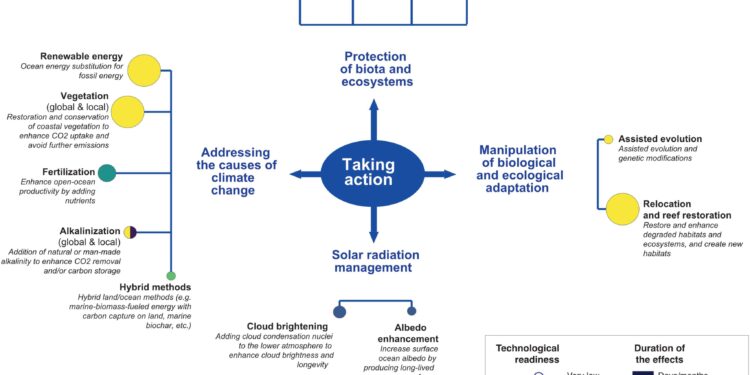Scientists and environmental experts are raising alarm over the rapid expansion of ocean-based climate interventions, warning that these emerging technologies are proceeding without adequate regulations or oversight. As efforts to combat climate change increasingly turn to the oceans-through methods such as carbon capture, geoengineering, and marine ecosystem manipulation-concerns grow about the potential ecological risks and governance gaps. A recent report highlighted by Mongabay underscores the urgent need for clear international rules to guide these experimental approaches, ensuring they do not cause unintended harm to marine environments or vulnerable coastal communities.
Scientists Raise Concerns Over Unregulated Ocean Climate Interventions
Emerging ocean-based climate interventions, such as iron fertilization and artificial upwelling, are increasingly capturing the interest of researchers and technologists aiming to curb global warming. However, experts are sounding alarms over the absence of clear regulatory frameworks governing these experimental techniques. Without international agreements or robust oversight mechanisms, there is a significant risk that such interventions could lead to unintended ecological consequences, disrupt marine ecosystems, or exacerbate existing environmental injustices, especially affecting vulnerable coastal communities.
Key concerns raised by scientists include:
- Lack of transparency: Many pilot projects operate without publicly available data, limiting independent review.
- Ecological unpredictability: Altering ocean chemistry may have cascading effects on biodiversity.
- Governance gaps: No unified global body currently regulates ocean interventions, leading to fragmented monitoring.
| Intervention Method | Primary Concern | Status |
|---|---|---|
| Iron Fertilization | Algal blooms affecting oxygen levels | Experimental |
| Artificial Upwelling | Disruption of local food webs | Early Testing |
| Ocean Alkalinity Enhancement | Uncertain chemical impacts | Theoretical |
Experts Call for Comprehensive Governance and Transparent Monitoring
Leading scientists stress the urgent need for a robust global framework to guide ocean-based climate interventions. Without clear governance, efforts such as carbon sequestration in marine ecosystems or geoengineering projects risk unintended ecological damage and geopolitical disputes. Experts emphasize the importance of involving multiple stakeholders, including indigenous communities, governments, and environmental organizations, to ensure that any ocean climate solutions align with sustainable and equitable principles.
Transparency in monitoring is equally critical. Researchers advocate for the establishment of real-time tracking systems combined with publicly accessible databases to track the progress and impact of various ocean-based strategies. The following table outlines their key recommendations to enhance accountability and environmental safety:
| Priority Area | Recommended Action | Expected Benefit |
|---|---|---|
| Regulatory Framework | Create binding international agreements | Clear operational guidelines |
| Stakeholder Engagement | Inclusive decision-making processes | Increased social legitimacy |
| Data Transparency | Publish monitoring reports openly | Enhanced public trust |
| Environmental Safeguards | Mandatory impact assessments | Risk minimization |
- Strengthen international cooperation to prevent fragmented or conflicting policies.
- Develop standardized metrics for evaluating ocean interventions’ effectiveness.
- Empower independent scientific oversight bodies to audit projects periodically.
Recommendations Urge International Collaboration to Establish Clear Oversight Standards
Experts emphasize the urgent necessity for a unified global framework to govern emerging ocean-based climate interventions. Without clear oversight, these large-scale projects risk unintended ecological harm, inequitable resource distribution, and geopolitical tensions. Leading voices in marine science and climate policy call for creating transparent guidelines that encompass environmental safety, ethical considerations, and community engagement. They advocate for a platform where governments, scientists, indigenous groups, and industry stakeholders can collaboratively shape governance principles.
Key points highlighted in recent recommendations include:
- Standardized risk assessments to evaluate potential impacts before deployment
- International monitoring mechanisms ensuring accountability and adaptive management
- Equitable benefit-sharing agreements that respect local communities and biodiversity
- Open data policies to facilitate scientific transparency and public scrutiny
| Governance Element | Purpose | Stakeholders Involved |
|---|---|---|
| Risk Assessment Protocols | Identify environmental hazards | Scientists, Regulators |
| Monitoring & Reporting | Track ongoing project impacts | International Bodies, NGOs |
| Benefit-Sharing Frameworks | Ensure fair access to resources | Local Communities, Governments |
| Open Data Access | Promote transparency and research | Public, Research Institutions |
To Conclude
As the urgency to address climate change intensifies, the scientific community’s call for stricter regulation and oversight of ocean-based climate interventions grows louder. Without clear international guidelines and robust monitoring mechanisms, these emerging technologies risk unintended ecological consequences that could undermine their intended benefits. Policymakers and stakeholders must now act swiftly to establish comprehensive frameworks that ensure responsible research and deployment, safeguarding the ocean’s health alongside the global climate.










